
|
Astronomy Picture Of the Day (APOD)
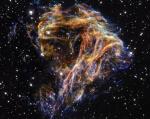 N49's Cosmic Blast
N49's Cosmic Blast
6.03.2004
Scattered debris from a cosmic supernova explosion lights up the sky in this gorgeous composited image based on data from the Hubble Space Telescope. Cataloged as N49, these glowing filaments of shocked gas span about 30 light-years in our neighboring galaxy, the Large Magellanic Cloud.
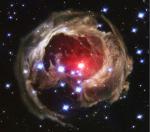 V838 Mon: Echoes from the Edge
V838 Mon: Echoes from the Edge
5.03.2004
Variable star V838 Monocerotis lies near the edge of our Milky Way Galaxy, about 20,000 light-years from the Sun. Still, ever since a sudden outburst was detected in January 2002, this enigmatic star...
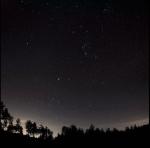 Cold Mountain Sky
Cold Mountain Sky
4.03.2004
This lovely celestial view is surely a familiar one to winter skygazers in the northern hemisphere. Lights silhouetting the trees are from nearby towns Morganton and Rutherford College, North Carolina, USA. But the scene may also look familiar to attentive fans of the movie Cold Mountain, whose fictional characters discuss this same factual starry sky.
 Opportunity Rover Indicates Ancient Mars Was Wet
Opportunity Rover Indicates Ancient Mars Was Wet
3.03.2004
Was Mars ever wet enough to support life? To help answer this question, NASA launched two rover missions to the red planet and landed them in regions that satellite images indicated might have been covered with water.
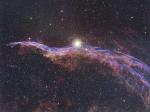 NGC 6960: The Witchs Broom Nebula
NGC 6960: The Witchs Broom Nebula
2.03.2004
Ten thousand years ago, before the dawn of recorded human history, a new light must suddenly have appeared in the night sky and faded after a few weeks. Today we know this light was an exploding star and record the colorful expanding cloud as the Veil Nebula.
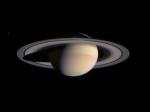 Cassini Closes in on Saturn
Cassini Closes in on Saturn
1.03.2004
Are they gone? They were not originally predicted to even be there. The mystery revolves around strange shadow-like spokes that appeared on Saturn's large B-ring, the large middle ring in the complex system of particles that orbits Saturn.
 Julius Caesar and Leap Days
Julius Caesar and Leap Days
29.02.2004
Today, February 29th, is a leap day - a relatively rare occurrence. In 46 BC, Julius Caesar, pictured above in a self-decreed minted coin, created a calendar system that added one leap day every four years.
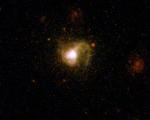 POX 186: Not So Long Ago
POX 186: Not So Long Ago
28.02.2004
Not so long ago and not so far, far away, a galaxy was born. Seen in this Hubble Space Telescope image, the island universe of stars, gas, and dust cataloged as POX 186 is a mere 68 million light-years distant toward an uncrowded region in the constellation Virgo.
 Rumors of a Strange Universe
Rumors of a Strange Universe
27.02.2004
Only a few short years ago, when the APOD editors were in graduate school, the pervasive, cosmic Dark Energy was not even seriously discussed. Of course, it now appears that this strange energy dominates the cosmos (as well as lectures on cosmology) and provides a repulsive force accelerating the large scale expansion of the Universe.
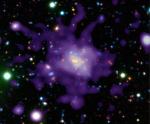 Galaxy Cluster in the Early Universe
Galaxy Cluster in the Early Universe
26.02.2004
Long before medieval alchemists dreamed of transmuting base metals to gold, stellar furnaces in this massive cluster of galaxies - cataloged as RDCS 1252.9-2927 - had transformed light elements into heavy ones. In the false-color composite image individual cluster galaxies can be seen at optical and near-infrared wavelengths, shown in red, yellow, and green colors.
|
January February March April May June July August September October November December |
|||||||||||||||||||||||||||||||||||||||||||||||||